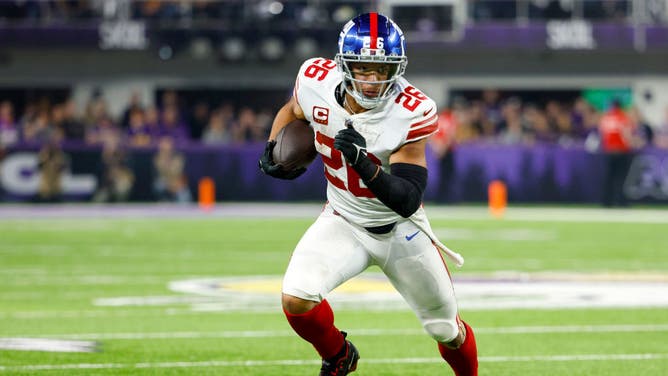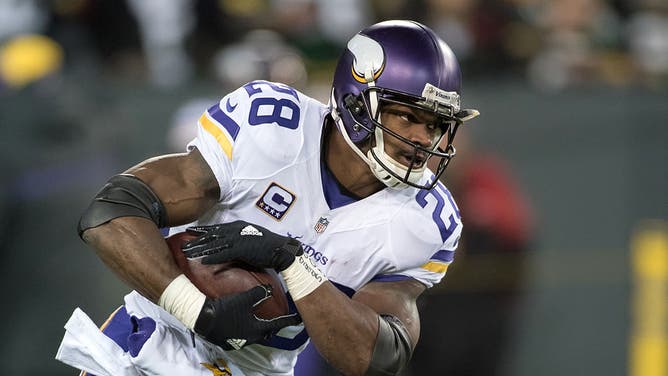Sony Michel Retirement Perfectly Encapsulates The Problem For NFL Running Backs
NFL running back Sony Michel abruptly retired over the weekend. The Rams re-signed him in June, expecting him to play this season. But after just five seasons in the NFL with the Patriots, Rams and Chargers, the 28-year-old back called it a career.
His retirement highlights the biggest issue facing running backs in today's football world: longevity. Everyone knows that exists. Running back has never been a position where players stick around for more than five or six seasons.
Why? Because of all the positions on a football field, running back relies the most on athleticism and the least on experience.
Take a position like wide receiver. Yes, wide receivers need to be fast, strong and athletic. But over the course of a career, great wide receivers learn from experience. As they start to slow down, they gather knowledge on how to run better routes. Even lacking top-end speed or quickness, they can use their bodies in new ways.
It's exactly like in basketball, the thing called "old man game." Yeah, he might not be able to blow by defenders and get to the hoop anymore. But he adapts his game to his current skill set.
The problem for running backs is that experience does not help nearly as much as the loss of athleticism hurts. Running backs are reliant on speed, short-area quickness and, frankly, their teammates blocking properly.
None of those things is improved with age. Plus, they get hit the hardest and the most frequently.
And NFL teams know this. That's why the New York Giants don't want to give 26-year-old Saquon Barkley a four or five-year contract. His value is going to plummet over the next two or three seasons.
It's also why 28-year-olds Dalvin Cook and Ezekiel Elliott are unemployed. If a team offered them $10 million, they'd take it. But that offer isn't coming.
Of course there are exceptions to every rule, even the NFL running back cliff
Yes, there are guys that disprove the notion of dropping off a cliff, athletically-speaking, around age 27. And, sure, great running backs become assets in other ways. They learn how to pass block better by understanding opponent defensive schemes. They make themselves useful in the passing game.
The other problem working against running backs is simply the value of a rushing play in the NFL. There's no question that running plays aren't as valuable as they once were. All of the data shows this. Passing plays create bigger plays for offenses, and that's clear.
As an avid fantasy football player, this becomes even more clear. Drafting running backs who rely on the ground game is an old-school tactic. You want great running backs in your lineup? Draft guys who catch passes.
Ultimately, running backs decline with age and their most important skill -- running the football -- is losing value. That's not a great combination.

Great NFL running backs like Saquon Barkley of the New York Giants aren't as valuable as they once were. (Photo by David Berding/Getty Images)
The NFL running back community is upset. Rightfully so. The average length of a running back career is very short. Likely for an NFL running back, the best hope is to receive one big contract.
They are drafted out of college and immediately under contract for the first four seasons of their career. That's both good and bad.
The good is that they are guaranteed that first payday. The bad is that the potential second contract hits right as the decline sets in.
Thus, running backs are trying to band together to demand more money in those second contracts. Unfortunately, it's just not going to work.
Great RBs are usually high draft picks, but even the best don't age gracefully
I did a deep-dive into the stats over the past few years. It turns out that great running backs are much harder to find than people realize. The best almost always come from the first three rounds of the NFL Draft.
But even those guys just do not age well. Look at the NFL rushing leaders last season. The first running back on the list over the age of 28 is Raheem Mostert (30). He finished 21st in rushing last season.
In 2021, Cordarrelle Patterson gained the most rushing yards among players 29+ years old. He ranked 32nd.
You have to go back to 2019 to find a 29-year-old running back in the Top 15 in NFL rushing yards (Carlos Hyde, 13th, and Mark Ingram, 14th).
Adrian Peterson, one of those rare exceptions, is the only player in the last five seasons to finish in the Top 10 in NFL rushing yards after his 29th birthday. And the year he accomplished that feat -- 2018 -- not one other player in the Top 10 was older than 24.

Former NFL running back Adrian Peterson is one of the rare guys who had success as an RB into his 30s. (Photo by Robin Alam/Icon Sportswire via Getty Images)
The unfortunate truth for running backs is fairly clear. Their market value is at an all-time low. Complaining about it isn't going to change that.
Melvin Gordon recently said if he could go back in time, he'd have chosen a different position entirely.
And that's the direction we're headed. Young players are just going to refuse to play the position. They're going to follow the money, like everyone does in a capitalist society.
Want to get paid? Be a wide receiver instead. Go play cornerback. Those guys get paid.
What's next for NFL running backs?
There's no tenable solution out there. The market dictates the value. Changing the franchise tag system might mitigate some of the problems. But certainly not all of them.
Running backs in the NFL are like ancient species. Some, like alligators and crocodiles, adapted to the changing planet. They're still around.
Others, like the Tyrannosaurus Rex, didn't. They're extinct.
Perhaps one day you're going to take your grandkids to the Pro Football Hall of Fame. They might say, "Hey grandad, who's that?"
And, with wistfulness in your eyes, you'll say, "That's Adrian Peterson. He was one of the greatest running backs to ever play the game. And I saw him live."
And they'll respond, "what's a running back?"
"That's a story for another day, junior."